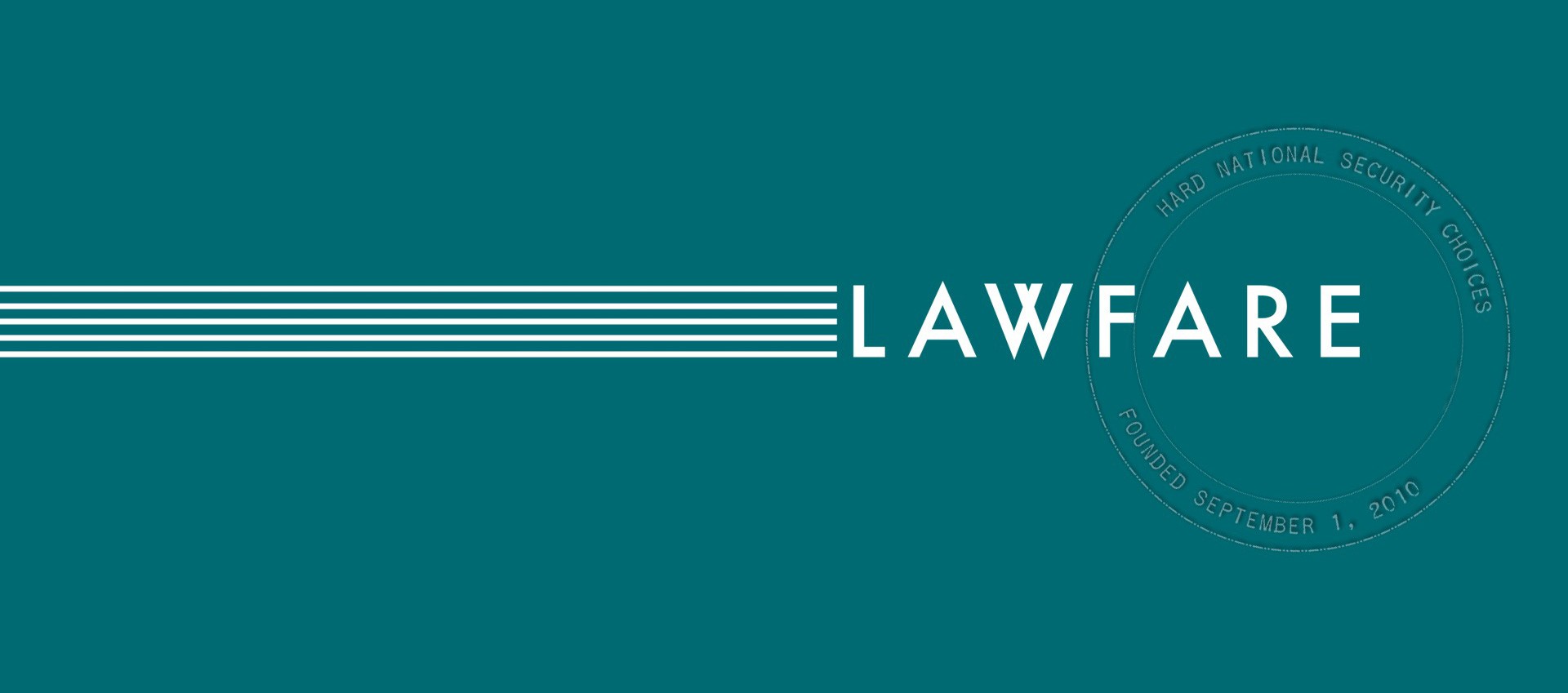The Week That Was: All of Lawfare in One Post
Your weekly summary of everything on the site.

Published by The Lawfare Institute
in Cooperation With

Anna Bower, Tyler McBrien, Katherine Pompilio, and Benjamin Wittes reported on Stormy Daniels’s first day on the stand in former President Donald Trump’s New York trial, where Trump’s attorney moved for a mistrial because of Daniels’ detailed testimony, and more.
Bower, McBrien, and Wittes reported on days 10 and 11 of Trump’s hush money trial. They discussed former White House communications director Hope Hicks’s tearful testimony, another hearing to determine whether Trump would (once again) be held in contempt, and more.
Quinta Jurecic and McBrien unpacked several misconceptions regarding the prosecution's legal theory in Trump’s hush money trial, including which object offense District Attorney Alvin Bragg must prove beyond reasonable doubt, whether there must unanimity in the jury, and more.
On May 10 at 3 p.m. ET, Roger Parloff sat down with Anna Bower, Benjamin Wittes, and Jacob Shamsian for Lawfare’s post-court dispatch. If you couldn’t attend the live event, the recording is available on Lawfare’s YouTube channel or later on the Lawfare Podcast feed. You can also watch all other previous dispatches here:
On Lawfare Daily, Wittes sat down with Bower, McBrien, and Parloff for an episode of “Trump's Trials and Tribulations” to discuss Judge Aileen Cannon’s order suspending the trial start date of May 20 in the classified documents case, the Georgia Court of Appeals decision to hear Trump and his co-defendants’ appeal of Judge Scott McAfee’s decision keeping District Attorney Fani Willis on the case, and more:
Pompilio shared a ruling from the U.S. Court of Appeals for the D.C. Circuit, upholding Steve Bannon’s conviction for failing to comply with a subpoena from the Jan. 6 committee.
Parloff explained how a claim by Waltine Nauta’s defense attorney Stanley Woodward Jr. that he was intimidated in a meeting with four prosecutors from the Special Counsel’s in 2022 is making its way into the case in 2024.
On Rational Security, Alan Z. Rozenshtein, Jurecic, and Scott R. Anderson were joined by Eugenia Lostri to hash through the week’s big national security news. They discussed the Biden administration’s new multilateral strategy for “digital solidarity,” what it means for U.S. policymakers if Israeli forces begin an assault on Rafah, how universities have responded to the student protests on campuses over the U.S. support for the war in Gaza, and more:
On Lawfare Daily, Wittes delivered a lecture at the Watson Institute for International and Public Affairs at Brown University concerning the Israel-Gaza war and the implications for U.S. foreign and domestic policy. He talked about Israel’s incompatible objectives of freeing hostages and eradicating Hamas, the moral context of the war, U.S.-Israeli relations in this context, and more:
On Lawfare Daily, McBrien sat down with Andrew Reddie to discuss wargaming as a tool, how it can be used to manage risk from war to climate, and more:
William Byrd considered unexplored opportunities and practical measures—such as substituting imports with domestic production and collecting aviation fees—to encourage economic development and promote economic stability in Afghanistan under Taliban rule.
In the latest installment of Lawfare’s Foreign Policy Essay series, Jennifer Lind discussed the rising concerns considering the desires of U.S. allies—such as South Korea and Germany—that want to abandon their nuclear nonproliferation commitments in light of increasing regional tensions—and how the United States should respond.
Ashley Deeks, Mitu Gulati, and Paul Stephan unpacked the REPO Act—the recently passed legislation gives President Joe Biden authority to seize frozen Russian assets for the benefit of Ukraine—and its implications. They argued that the Biden administration should establish an international mechanism to determine and satisfy Ukraine’s right to compensation from Russia, and take a “set-off” approach to tying Ukraine’s money to international claims to better fit within the U.S. legal process and mitigate risks.
Hyemin Han shared a complaint filed by TikTok Inc. and Bytedance Ltd. in the U.S. Court of Appeals for the D.C. Circuit against the U.S. government for passing a bill that bans TikTok if ByteDance does not divest.
Matthew Perault explained TikTok’s progress implementing Project Texas—a plan to address the United State’s national security concerns raised by Congress—since January 2023.
On Chatter, Matt Gluck sat down with David Ignatius to discuss his newest spy thriller, “Phantom Orbit,” which is a story of intelligence and the advance of space technology in the age of intensified geopolitical competition between the U.S., China, and Russia:
On Lawfare Daily, Gluck sat down with Juliette Kayyem to discuss the White House’s “National Security Memorandum on Critical Infrastructure Security and Resilience,” which marks the beginning of a new comprehensive initiative to safeguard U.S. infrastructure against current threats and those on the horizon. They talked about what it means to share responsibility and information, how geopolitics affect the U.S.’s approach to protecting critical infrastructure, and more:
Gluck shared the State Department’s “United States International Cyberspace & Digital Policy Strategy.”
Gluck also shared the White House’s “2024 Report on the Cybersecurity Posture of the United States” and the second version of the “National Cybersecurity Strategy Implementation Plan.”
Paul M. Barrett examined Zuckerman v. Meta Platforms, a case filed by internet policy expert Ethan Zuckerman which aims to give social media users greater control over what content they see on their feeds.
James Grimmelmann, Blake E. Reid, and Rozenshtein explained the importance of identifying neutral performance baselines in technological regulation and why it is impossible to establish them in order to evaluate foundation models of generative AI. They argued that policymakers and regulators instead will find greater success in evaluating output with a narrow focus on the specific application in question.
Daniel Byman, Daniel Linna, and V.S. Subrahmanian argued that although democratic governments should avoid using deepfakes due to the high risk of tarnishing their credibility, there may be certain exceptions to their use when accompanied by safeguards to maintain public trust.
Gabriel Weil evaluated the Safe and Secure Innovation for Frontier Artificial Intelligence Models Act, a bill proposed in California that requires artificial intelligence (AI) developers to adopt precautions to make their systems safe.
In the latest edition of the Seriously Risky Business cybersecurity newsletter, Tom Uren discussed Microsoft’s all-hands memo prioritizing security, law enforcement’s reveal of Russian national Dmitry Yuryevich Khoroshev as the ransomware group LockBit’s ringleader, UnitedHealth Group CEO Andrew Witty’s testimony to Congress regarding the Change Healthcare cyberattack, and more.
On Lawfare Daily, Jack Goldsmith sat down with David Pozen to discuss his new book, “The Constitution of the War on Drugs,” which examines the relationship between the Constitution and drug prohibitions. They discussed the constitutional history of the war on drugs, why the drug war was not curbed by constitutional doctrines about personal autonomy, whether the political process is working with advancing decriminalization and how this impacts the constitutional dimension of the drug war, and more:
On April 3, Lawfare announced another auction item on the Givebutter campaign—the “Black Hole of Awful” Post-It by Jurecic, one-of-a-kind Lawfare sketch born from a conversation with Wittes that illustrates the extent to which trial delay is advantageous to Trump. Another piece of exclusive Lawfare merchandise up for auction is Wittes’s Twitter sensation and protector of democracy #BabyCannon. Place your bids to support Lawfare’s Trump Trials coverage. You can also support Lawfare’s Trump Trials coverage by making a contribution here.
And Lawfare is hiring! We are accepting applications for a new full-time associate editor based in Washington, D.C. Associate editors play a pivotal role in Lawfare’s coverage. The application deadline is May 20.
And that was the week that was.

